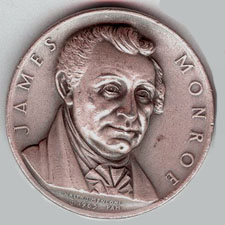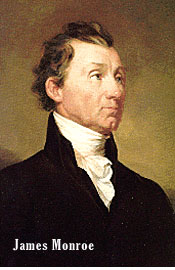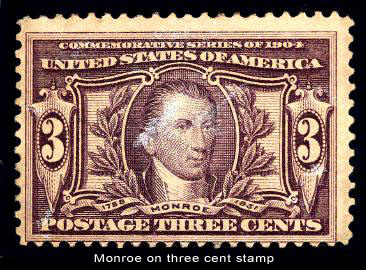|
FRESH STUFF DAILY |
|
|
||
|
|
||
|
|
||
|
SEE ALL SIGNED BOOKS by J. Dennis Robinson click here |
||
It was all pomp and little substance when the fifth president of the United States made his way to Portsmouth in 1817. The second war with Britian was finally over and an era of good feeling but poor economy was upon the land. Monroe followed closely in the steps of George Washington, but he was no George Washington.
READ: Washington Visits Portsmouth
Hail Columbia! Nothing excites a community more than a presidential visit. Such occasions are, without regard to party, usually ceremonious, and often joyful. George Washington arrived on October 31, 1789, toward dusk, and spent four nights in the old town by the sea, longer than any other incumbent president has ever done. Washington came because he was well aware that few people knew what he looked like and he admitted his own need to get out among the people. Familiar as that story is to most Seacoast residents, few know who the next presidential visitor was. The Fifth President Arrives James Monroe, the fifth President came in July, 1817 just a few short months after his inauguration. President Monroe, like the first President, had decided on a leisurely "progress" through the northeastern states. He reached Portsmouth, New Hampshire about 7 p.m. on Saturday, July 12. The Portsmouth Journal reported: "He was met at Greenland by the committee of arrangement and a numerous cavalcade of citizens on horseback and in carriages, and the company of cavalry belonging to the 35th regiment. When he passed the lines of the town, it was announced by a national salute from the Artillery Company under Capt. Currier, stationed on the Plains; and on the arrival of the President at that place, he reviewed the First Regiment, under the command of Col. Walker, which was ordered out for his reception. When passing Wibird's hill he was again welcomed by a national salute from the company of Sea Pencibles, under Capt. Brown, and by the ringing of the bells; after which he was escorted into town, through lines formed by the scholars of the several public and private schools in this place, who were arranged on each side of Middle Road, extending from Mr. Rundlett's to Maj. Larkin's house. Their numbers were considerably over a thousand, they were in neat uniforms, and furnished an interesting and pleasing spectacle." The Journal continues: "The windows on the streets through which the President passed were crowded with the fair, and the streets lined with spectators, anxious to view the man who had been raised to the highest possible honor, that of being the Chief Magistrate of a free people." The presidential entourage moved up Congress Street to Market Square. The entrance to Market Street was spanned by a floral arch that had been put together by the women of the town. A band provided music as he traveled along Market Street to Frost's Hotel. That structure, long since gone, had a balcony over its front door and the President was escorted into the hotel and out onto the balcony where he faced the people jamming the street below.
Save Us, Monroe! To the great lawyer, Jeremiah Mason, went the honor of making the official speech of welcome. Monroe too was a lawyer. It is hard to imagine a modern politician delivering such a speech today, but this was an age when, thanks in part to grand orators like Daniel Webster, when speech-making was taken very seriously. It is not hard, even today, to read between the lines of Mason's address which was reprinted in the Journal" "Sir -- the presence of the Chief Magistrate, selected for his eminent virtues and public services, to preside over and direct the councils of a great nation, must always excite feelings of the highest interest. The inhabitants of the town of Portsmouth, remote from the seat of the general government, can expect few opportunities of witnessing such a gratifying scene. We therefore, eagerly embrace this occasion to present our ardent and sincere congratulations. " Mason continued: "Engaged chiefly in the business of commerce and navigation, we know our times are, in a peculiar manner, dependent on the measures of that government, to which the protection of those important objects, is exclusively confided. These enterprising pursuits, which have always been greatly contributory to the general welfare, are now suffering under a temporary depression. But we have entire confidence, that the wisdom and justice of government, will extend to them all the protection and support, that shall be in its power. In summary, Mason placed the hopes and dreams of economic recovery directly on the President's doorstep. He, and he alone, Mason implied, would need to make things right through "arduous and honorable service, which is entrusted to you, by the citizens of the United States." In Washington's Footsteps Like President George Washington, Monroe replied to the welcome in gracious phrases, making the promises the beleaguered people of Portsmouth needed to hear. Although things were still going badly here, the nation was on an economic upswing. At his conclusion the Portsmouth regiment of militia passed in review. With that ceremony concluded, the President was escorted to his lodgings on what was then called Jaffery Street, but known to us as Court Street. Many years ago, then Librarian Dorothy Vaughan discovered that the building where Monroe stayed was the Folsom-Salter House. It was managed at the time of Monroe's visit by a man named Wentworth, and has, of course, been moved from its original site to one further west and on the opposite side. For some years, it was the law office of the late Thomas E. Flynn and his associates. In a later day it has served as a restaurant.
The next day of his visit being Sunday, President Monroe had to undergo two church services. As Washington had done before him, he attended St. John's in the morning and the North Church in the afternoon. The St. John's of Washington's day burned in 1806, and the North was torn down in 1854 to make way for the present edifice. Monroe also visited with John Langdon, the Revolutionary leader, first NH governor and shipbuilder, then in the last year of his life. Langdon had also entertained Washington during his visit at his house on Pleasant Street. His acquaintance with Monroe went back many years. Again following Washington's path, on Monday the President toured the harbor, the forts and the Portsmouth Navy Yard over in the District of Maine. That evening he had to attend a concert in Jefferson Hall presented by the Social Harmonic Society. Given his "druthers," the President might have preferred going to the theater where a five-act production, 'Abellino, the Great Bandit," was playing. The next morning, Tuesday, President Monroe left Portsmouth "for the eastward." Originally published by Raymond Brighton in Portsmouth Rambles, Portsmouth Marine Society, Peter E. Randall Publisher, 1994. Reprinted by permission of the publisher. First published online here in 1998. Edited by SeacoastNH.com. OUTSIDE LINK: James Monroe on White House web site Please visit these SeacoastNH.com ad partners.
News about Portsmouth from Fosters.com |
| Tuesday, April 16, 2024 |


|
Copyright ® 1996-2020 SeacoastNH.com. All rights reserved. Privacy Statement
Site maintained by ad-cetera graphics

 Smuttynose Murders
Smuttynose Murders




 Editor's Note: President James Monroe (1758-1831) was an ideal second act to follow George Washington's still-talked-about visit to Portsmouth, NH. A teenage veteran of the Revolutionary War, Monroe had been an aid to Washington. A lawyer, Senator and twice governor of Virginia, Monroe was special envoy to France under Thomas Jefferson. In an ironic connection to Portsmouth, Monroe was Tobias Lear's boss at the War Department when the British burned the nation's capitol in 1614, two years before Lear killed himself. Monroe's presidency (1817-1825) coincided with the "Era of Good Feelings" at the end of the war with Britain. He is best known, of course, for his Monroe Doctrine which stated that the American continent was out of bounds for European colonization. Jefferson described him as a man without a blemish, and Monroe --- just like presidents John Adams and Thomas Jefferson before him – died on the Fourth of July. - JDR
Editor's Note: President James Monroe (1758-1831) was an ideal second act to follow George Washington's still-talked-about visit to Portsmouth, NH. A teenage veteran of the Revolutionary War, Monroe had been an aid to Washington. A lawyer, Senator and twice governor of Virginia, Monroe was special envoy to France under Thomas Jefferson. In an ironic connection to Portsmouth, Monroe was Tobias Lear's boss at the War Department when the British burned the nation's capitol in 1614, two years before Lear killed himself. Monroe's presidency (1817-1825) coincided with the "Era of Good Feelings" at the end of the war with Britain. He is best known, of course, for his Monroe Doctrine which stated that the American continent was out of bounds for European colonization. Jefferson described him as a man without a blemish, and Monroe --- just like presidents John Adams and Thomas Jefferson before him – died on the Fourth of July. - JDR
















